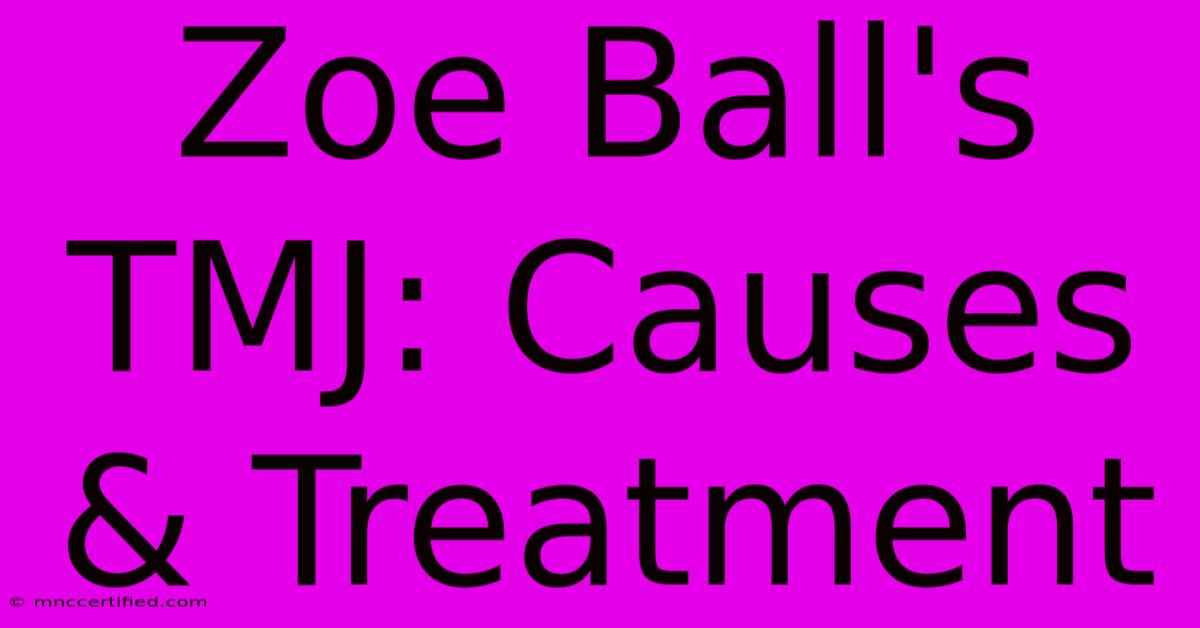Zoe Ball's TMJ: Causes & Treatment

Table of Contents
Zoe Ball's TMJ: Causes & Treatment – Understanding Temporomandibular Joint Disorder
Zoe Ball, the beloved British radio and television presenter, has openly discussed her struggles with Temporomandibular Joint Disorder (TMJ). Her experience shines a light on this often-misunderstood condition, highlighting the importance of understanding its causes and available treatments. This article delves into the specifics of TMJ, exploring potential causes and effective treatment options.
What is Temporomandibular Joint Disorder (TMJ)?
TMJ is a condition affecting the temporomandibular joint (TMJ), the hinge connecting your jaw to your skull. This joint allows you to open and close your mouth, chew, and speak. When this joint becomes inflamed or misaligned, it can lead to a range of debilitating symptoms. TMJ is not a single disease, but rather a collection of symptoms stemming from various underlying issues.
Causes of TMJ: Unraveling the Mystery
Pinpointing the exact cause of TMJ can be challenging, as it often involves a combination of factors. Common causes include:
1. Injury and Trauma:
- Direct blows to the jaw: Accidents, sports injuries, or even a fall can severely damage the TMJ.
- Whiplash: This sudden, forceful movement of the neck can also affect the jaw joint.
2. Arthritis:
- Osteoarthritis: The wear and tear of aging can lead to cartilage degeneration within the TMJ.
- Rheumatoid arthritis: This autoimmune disease can cause inflammation and damage to the joint.
3. Bruxism (Teeth Grinding):
- Nocturnal bruxism: Grinding your teeth while asleep is a significant contributor to TMJ.
- Diurnal bruxism: Grinding or clenching your teeth during the day can also put excessive stress on the TMJ. Stress and anxiety are often linked to bruxism.
4. Genetic Predisposition:
- Family history of TMJ can increase your risk.
5. Misalignment of the Jaw:
- Malocclusion (incorrect bite): An uneven bite can place unequal pressure on the TMJ.
6. Other Contributing Factors:
- Stress: Chronic stress can exacerbate TMJ symptoms.
- Posture: Poor posture can strain the jaw muscles.
- Certain medical conditions: Some autoimmune disorders or connective tissue diseases can contribute to TMJ.
Symptoms of TMJ: Recognizing the Warning Signs
TMJ symptoms vary significantly in severity and presentation. Some common signs include:
- Jaw pain: This can range from mild discomfort to severe, debilitating pain.
- Headaches: TMJ pain can often radiate to the head, causing headaches, particularly temple headaches.
- Earaches: Pain in the ear is another common symptom, often mistaken for an ear infection.
- Neck pain: Muscle tension in the neck and shoulders is frequently associated with TMJ.
- Clicking or popping sounds in the jaw: This is often noticeable when opening or closing the mouth.
- Limited jaw movement: Difficulty opening or closing the mouth fully.
- Facial pain: Pain in the face, especially around the jawline.
Treatment for TMJ: Finding Relief
Treatment for TMJ is tailored to the individual's specific needs and symptoms. Options may include:
1. Conservative Treatments:
- Over-the-counter pain relievers: Ibuprofen or naproxen can help manage pain and inflammation.
- Heat or cold packs: Applying heat or cold to the affected area can provide temporary relief.
- Jaw exercises: Physical therapy and exercises can help strengthen jaw muscles and improve joint mobility.
- Stress management techniques: Relaxation techniques like yoga, meditation, or deep breathing can help reduce stress and alleviate TMJ symptoms.
- Mouthguards: Nightguards or splints can protect teeth from grinding and reduce strain on the TMJ.
2. More Invasive Treatments:
- Corticosteroid injections: Injections of corticosteroids can help reduce inflammation.
- Surgery: In severe cases, surgery may be necessary to repair or replace the TMJ. This is usually a last resort.
Conclusion: Seeking Professional Help
If you suspect you have TMJ, it's crucial to seek professional help. A dentist or oral surgeon can diagnose the condition and recommend appropriate treatment. Early intervention can often prevent the condition from worsening and significantly improve your quality of life. Zoe Ball's experience highlights the importance of seeking help and managing this often chronic condition effectively. Don't suffer in silence – understanding TMJ and seeking appropriate treatment is key to regaining comfort and function.

Thank you for visiting our website wich cover about Zoe Ball's TMJ: Causes & Treatment. We hope the information provided has been useful to you. Feel free to contact us if you have any questions or need further assistance. See you next time and dont miss to bookmark.
Featured Posts
-
Ishe Samuels Smith Our Action Plan
Nov 29, 2024
-
Supporting Him An Easy Inbox
Nov 29, 2024
-
Nice Vs Rangers Live Score And Updates
Nov 29, 2024
-
Master Chef Shakeup 13 Departures
Nov 29, 2024
-
Mc Donalds Open Thanksgiving Check Hours
Nov 29, 2024